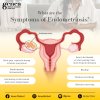PCOS: What You Need to Know About Fertility and Pregnancy

PCOS (Polycystic Ovary Syndrome) is something many women have heard about, but might not completely understand. It's a common hormone condition that can affect your ability to get pregnant. If you're thinking about having a baby now or in the future, knowing how PCOS works and what it means for pregnancy is really important.
Today, we'll explain what PCOS is, how it affects fertility, what risks it might create during pregnancy, and what treatment options are available to help you achieve your dream of having a baby.
Can You Get Pregnant with PCOS?
Polycystic Ovary Syndrome (PCOS) is a condition where a woman's body experiences hormonal imbalances, particularly elevated levels of male hormones (androgens), which directly impact ovarian function.
Imagine that during each menstrual cycle, eggs in a woman's ovaries develop gradually, with one becoming fully mature and releasing (known as ovulation) this is the time when pregnancy is possible.
However, for women with PCOS:
- Multiple eggs begin to develop, but none reach full maturity to trigger ovulation
- This results in either no ovulation or irregular ovulation during each cycle
- The unreleased eggs form small "fluid-filled sacs" that accumulate in the ovaries, creating the appearance of multiple cysts when viewed through ultrasound
In the long term, this affects fertility because without ovulation, natural pregnancy cannot occur. Additionally, women with PCOS often experience other symptoms such as:
- Irregular periods or absence of periods for several months
- Unusual acne breakouts
- Hair growth in unexpected places like the chin or chest
- Weight gain or insulin resistance
This condition is common among women of reproductive age, especially between 20-35 years, and is one of the leading causes of female infertility.
However, PCOS doesn't mean "pregnancy is impossible." Those affected may need close health monitoring, and sometimes fertility treatments to help achieve pregnancy.
Risks of PCOS During Pregnancy
These risks can be divided into two categories:
Risks for the Mother
- Gestational Diabetes: Women with PCOS have a 2-3 times higher risk of developing diabetes during pregnancy
- Hypertension During Pregnancy: Including preeclampsia
PCOS increases the risk of pregnancy-induced hypertension (PIH) and preeclampsia (high blood pressure with organ damage, often after 20 weeks). - Miscarriage: Women with PCOS have a higher risk of early miscarriage (possibly due to hormonal imbalances, insulin resistance, or inflammation).
- Premature Birth: Increased risk of delivery before 37 weeks. Preterm babies may face developmental challenges.
- Cesarean Section: Higher likelihood of requiring surgical delivery
Risks for the Baby
- Macrosomia (Large Birth Weight) : Birth weight exceeding 4 kilograms
- Oxygen Deprivation During Birth: Risk of oxygen shortage during delivery
- NICU Admission: Higher chances that the newborn will require special care
Medical Treatments for PCOS-Related Infertility

At Genea Thailand, we've consulted with many couples, and PCOS is one of the common challenges women face. We offer the following solutions:
1. Intrauterine Insemination (IUI)
IUI is a fertility treatment that closely resembles natural conception. It involves injecting selected sperm directly into the uterine cavity during ovulation to increase the chances of fertilization.
Who is IUI suitable for?
- Young couples with mild fertility issues
- Women with cervical mucus problems
- Men with sperm quality issues that still meet IUI criteria
(Learn more Click)
2. Intracytoplasmic Sperm Injection (ICSI)
ICSI is a technique used in in vitro fertilization where sperm is directly injected into the egg. It's appropriate for couples with various fertility issues, including women with PCOS who haven't succeeded with other treatments.
Who is ICSI suitable for?
- Couples with male-factor infertility, such as low-quality sperm
- Women with PCOS who cannot conceive naturally or through IUI
- Couples who have previously undergone unsuccessful IVF
(Learn more Click)
3. Egg Freezing
Egg freezing is a process where women can preserve their eggs for future pregnancy. It's ideal for those who aren't ready to have children now but want to maintain egg quality to increase chances of future pregnancy.
PCOS ovaries typically contain more follicles, so egg freezing cycles often retrieve more eggs than average. PCOS does not protect against age-related egg quality decline, so freezing eggs early (before 35) is beneficial.
Who is egg freezing suitable for?
- Women who wish to delay childbearing for personal or career reasons
- Those undergoing treatments that may affect fertility, such as chemotherapy
- Women with family histories of conditions that might impact fertility
(Learn more Click)
However, every woman's body responds differently. We recommend scheduling a consultation so our specialists can evaluate your individual situation and provide personalized recommendations.
Tips for Boosting Fertility with PCOS
Polycystic Ovary Syndrome (PCOS) can impact a woman's fertility, but several strategies may help improve the chances of conception:
- Maintain a Healthy Weight: Losing even 5-10% of body weight can help regulate menstrual cycles and promote ovulation.
- Balanced Diet: Consuming a diet rich in whole, unprocessed foods, including fruits, vegetables, whole grains, and legumes, can help manage insulin levels and support hormonal balance.
- Regular Exercise: Engaging in regular physical activity can improve insulin sensitivity and assist in weight management, both of which are beneficial for fertility.
- Monitor Ovulation: Tracking ovulation through methods like basal body temperature charting or ovulation predictor kits can help identify the most fertile periods.
- Manage Stress: Practicing stress-reduction techniques such as yoga, meditation, or counseling can positively influence hormonal balance and overall well-being.


